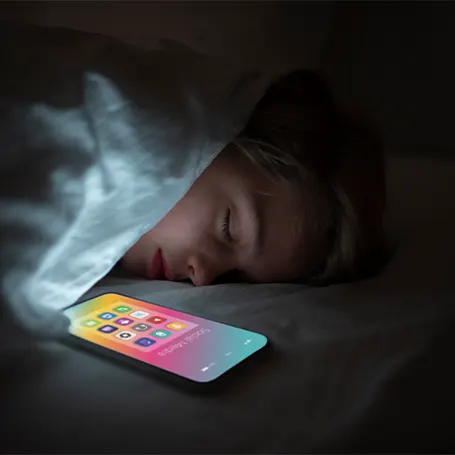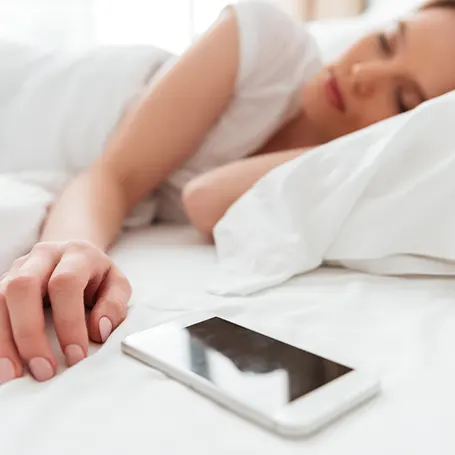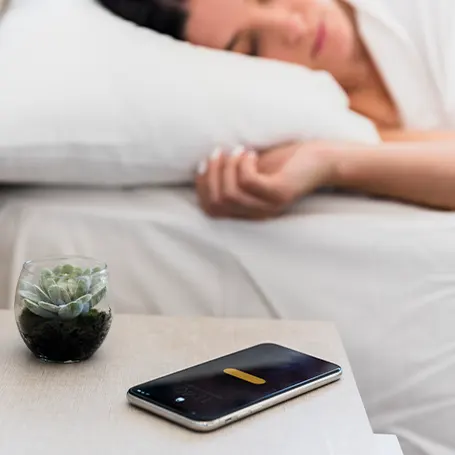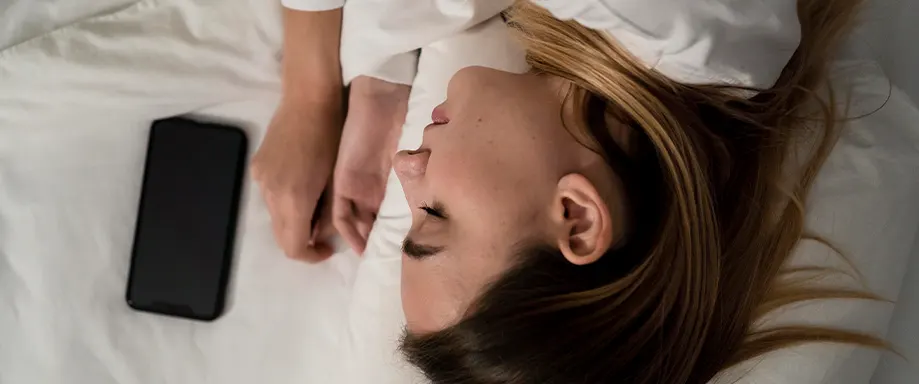Why should you keep your phone away when you sleep?

Radiation from cell phones (and other devices) can be associated with increased cancer risk and mental and reproductive health problems. Cell phones transmit information using low-frequency radio signals, which cause radiation. And it affects both men and women negatively. For example, research shows that there is a link between a cell phone's radiation and the quantity and quality of sperm.
This implies that this could have a very bad effect on fertility. In that case, men who carry a phone in their pocket will have fewer sperm. There is also research by psychologists that confirms the harmful effects of mobile phone radiation on the mental health, attention and sleep of adolescents. But we'll go more in-depth on those topics a bit later on.
Radio frequency & radiation emission
Harmful cell phone EMF radiation is all around you and the way electromagnetic radiation affects people depends on many factors. The most important is the power of the radiation source, but the frequency of the radiation has an equally great influence. Constant radiation exposure disrupts the energy structure of biological systems. The consequences can be various illnesses, both mental and physical.
In some situations, mobile phones emit more radiation than normal. Then it is especially important to keep them away from your head. For example, a mobile phone's 2G, 3G and 4G broadcast radio frequency is in the frequency range of 0.7-2.7 GHz while 5G uses a frequency spectrum up to 80 GHz. So, you can see that it has taken quite a noticeable leap.
Blue light
Most if not all cell phone users have experienced the feeling of staying on their phone late into the night and then not being able to fall asleep. And this isn't a coincidence as mobile phone use does directly hamper sleep. This is because of the short-wave light, also known as blue light, that most electronic devices utilise.
To understand why blue light is important, we first have to talk about your circadian rhythm. In short, it's your biological clock and it's comprised of various hormones and cells that all react to certain cues. One of the most important cues is light as it tells your circadian rhythm “It's day time, we need energy now”.
However, blue light affects our circadian rhythm in the same way. So, even though it's late at night, your body can think that you need energy. This can then lead to sleep disturbances and can throw your circadian rhythm out of the loop. And you definitely want the system that regulates sleep cycles to be in the loop. Plus, for children, this effect is especially potent since they're more sensitive to blue light.
So, if you or your child have trouble sleeping, have this in mind. Do you use your phone right before bed? And do you leave it somewhere close to your bed where you can see it whenever a new notification pops up? If so, try keeping it further away and using a regular alarm clock and then see whether it was the thing sabotaging your sleep quality!
Your mental health
An aspect of proper sleep people tend to underestimate is mental health. While it might not seem as tied to your sleep cycle as your circadian rhythm, it's arguably as important! That's because study after study has shown that things like stress, anxiety, and depression can cause insomnia and severely hamper your ability to get proper rest.
But what does this have to do with your phone? Well, let's be honest for a second and admit that the internet isn't always the kindest place. In fact, multiple studies have found correlations between social media and poor mental health. So, if you or your child get flustered or offended online or see something that shakes you up, you likely won't get the sleep you need.
Therefore, if you're an adult, try avoiding social media late at night. Or at least be conscious of the sites you are visiting. And if you have a child, try to make sure they aren't visiting sites with disturbing imagery and have an open conversation about cyberbullying – as you never know whether someone is potentially picking on them. Either way, it's best to just keep the phone out of reach during the evening and focus on getting in a happy headspace.
Damage to the phone
If you keep your phone close to your body or face while you sleep, you risk not only your health due to radio frequency energy but also the health of your phone. This is because you make unconscious movements during sleep and many of them are fatal for a mobile phone. For example, you can unknowingly push it off the bed or lie on it if you sleep next to your phone. In any case, great damage can occur.
If you are more worried about the condition of the phone, put it at least next to the bed on the nightstand. It should not be on the floor next to the bed, because you can stand on it when getting out of bed. If the phone is on the bed next to you, you will probably accidentally roll over it while sleeping. This means that the device will not receive adequate airflow and will heat up faster, which leads to battery damage.
Should I use airplane mode or turn the phone off?

If you turn on this mode in your mobile phone, you choose the best way to extend the battery life of your phone. The reason is the disconnection of data transmission. In that case, your battery will last much longer, but that's not all you can achieve with this mode.
Turning off the phone disables access to the mobile phone. If you find it difficult not to check social networks and other things on your phone in the evening, it is best to turn off the phone. This way you will not be tempted, and the battery consumption in this state is even lower because the phone is completely turned off.
So, how far away should your phone be when you sleep?

Experts from the World Health Organisation and other famous organisations recommend keeping your cell phone at least 1 meter away from the bed. This will limit exposure to radio frequencies. You also need to turn off your smartphones before going to bed or turn on aeroplane mode. Otherwise, you may experience headaches and other sleep-related problems.
Even though it is not standing next to your head, but a little further away, it is connected to the network and emits a small amount of radiation. Blue light affects the hormones that regulate sleep cycles, so it is advisable to keep the phone as far away from your bed as possible so that you do not have restless nights or health problems.
Conclusion
In conclusion, while we all love our phones, they can be quite detrimental to our sleep quality. So, how far away should your phone be when you sleep? As far as possible or at least 1 meter away from your face.













There are no comments yet
"*" indicates required fields